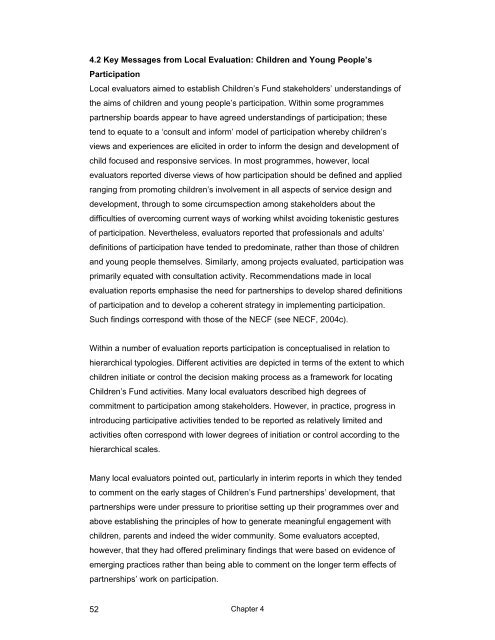Local Evaluation of Children's Services Learning from the Children's ...
Local Evaluation of Children's Services Learning from the Children's ...
Local Evaluation of Children's Services Learning from the Children's ...
- No tags were found...
You also want an ePaper? Increase the reach of your titles
YUMPU automatically turns print PDFs into web optimized ePapers that Google loves.
4.2 Key Messages <strong>from</strong> <strong>Local</strong> <strong>Evaluation</strong>: Children and Young People’sParticipation<strong>Local</strong> evaluators aimed to establish Children’s Fund stakeholders’ understandings <strong>of</strong><strong>the</strong> aims <strong>of</strong> children and young people’s participation. Within some programmespartnership boards appear to have agreed understandings <strong>of</strong> participation; <strong>the</strong>setend to equate to a ‘consult and inform’ model <strong>of</strong> participation whereby children’sviews and experiences are elicited in order to inform <strong>the</strong> design and development <strong>of</strong>child focused and responsive services. In most programmes, however, localevaluators reported diverse views <strong>of</strong> how participation should be defined and appliedranging <strong>from</strong> promoting children’s involvement in all aspects <strong>of</strong> service design anddevelopment, through to some circumspection among stakeholders about <strong>the</strong>difficulties <strong>of</strong> overcoming current ways <strong>of</strong> working whilst avoiding tokenistic gestures<strong>of</strong> participation. Never<strong>the</strong>less, evaluators reported that pr<strong>of</strong>essionals and adults’definitions <strong>of</strong> participation have tended to predominate, ra<strong>the</strong>r than those <strong>of</strong> childrenand young people <strong>the</strong>mselves. Similarly, among projects evaluated, participation wasprimarily equated with consultation activity. Recommendations made in localevaluation reports emphasise <strong>the</strong> need for partnerships to develop shared definitions<strong>of</strong> participation and to develop a coherent strategy in implementing participation.Such findings correspond with those <strong>of</strong> <strong>the</strong> NECF (see NECF, 2004c).Within a number <strong>of</strong> evaluation reports participation is conceptualised in relation tohierarchical typologies. Different activities are depicted in terms <strong>of</strong> <strong>the</strong> extent to whichchildren initiate or control <strong>the</strong> decision making process as a framework for locatingChildren’s Fund activities. Many local evaluators described high degrees <strong>of</strong>commitment to participation among stakeholders. However, in practice, progress inintroducing participative activities tended to be reported as relatively limited andactivities <strong>of</strong>ten correspond with lower degrees <strong>of</strong> initiation or control according to <strong>the</strong>hierarchical scales.Many local evaluators pointed out, particularly in interim reports in which <strong>the</strong>y tendedto comment on <strong>the</strong> early stages <strong>of</strong> Children’s Fund partnerships’ development, thatpartnerships were under pressure to prioritise setting up <strong>the</strong>ir programmes over andabove establishing <strong>the</strong> principles <strong>of</strong> how to generate meaningful engagement withchildren, parents and indeed <strong>the</strong> wider community. Some evaluators accepted,however, that <strong>the</strong>y had <strong>of</strong>fered preliminary findings that were based on evidence <strong>of</strong>emerging practices ra<strong>the</strong>r than being able to comment on <strong>the</strong> longer term effects <strong>of</strong>partnerships’ work on participation.52Chapter 4
















